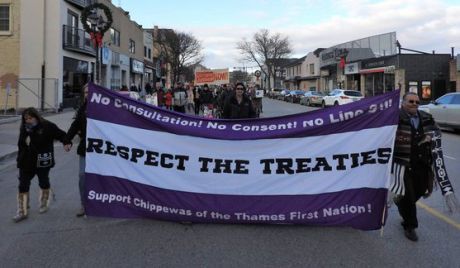News
You are here
Chippewas of the Thames: “This will keep us fighting!”

July 27, 2017
In a hugely disappointing decision, the Supreme Court of Canada ruled against the Chippewas of the Thames First Nation (COTT) in its appeal against Enbridge. The National Energy Board (NEB) in 2015 gave approval for Enbridge to begin flowing tar sands oil through its 40-year old Line 9 pipeline. The high likelihood of a spill was enough for COTT to fight against this decision, as a way of protecting the waterway (Thames River) on which it has depended as a food source and for cultural ceremonies. After winning at the federal appeals court, COTT had its Supreme Court of Canada hearing at the end of November 2016.
Along the way, COTT picked up financial support from hundreds of individuals as well as trade unions, student unions and other community organizations.
The court case
COTT argued that the Crown had failed to adequately consult with the nation prior to NEB providing approval for Enbridge to allow tar sands oil to flow through Line 9.
While COTT had engaged in conversations to express its environmental and cultural concerns to both Enbridge and the NEB, at no time did COTT consider these conversations to be with “the Crown.” Furthermore, the federal government did not clarify with COTT until after the NEB hearings were finished, that those hearings and discussions constituted “Crown consultation.”
But in providing the rationale for the unanimous decision, the Supreme Court of Canada ruled not only that NEB had delegated authority to conduct “Crown” consultation, but that it had done so in this case, and had taken into consideration COTT rights and concerns (!)
To any outside observer, it is obvious that if one party says it has been wronged by another party, then it is not up to that other party to declare whether a wrong has occurred. In the COTT situation, since COTT has said it does not consider legitimate Crown consultation to have occurred, then who is the Supreme Court to say otherwise?
Community reaction
As former COTT Chief and longtime indigenous rights activist Del Riley said at the community centre where the court decision was announced, “We face an all white jury.” He went on to say there is a conflict of interest for NEB, since it was both conducting discussions with COTT as well as assessing whether Crown consultation had taken place. (It’s like NEB was saying “Crown consultation took place because we said it did.”) Riley said “It all comes down to the Doctrine of Discovery” – the belief of European governments that settled Turtle Island that they had “discovered” the Americas.
Newly elected Chief and prominent campaigner Myeengun Henry said “We will keep fighting. I was at Oka and I guess we have to continue. You can’t change the nation to nation relationship just by saying after the (NEB) hearing that the NEB is acting for the Crown.”
Councillor Denise Beeswax noted “We can’t have a country that excludes our voices. The land belongs to us regardless of what the Crown says.”
Ceremony and statements to government and Enbridge
Community members and invited guests left the community centre and held a pipe ceremony on the Thames River near where the Enbridge pipeline crosses. Chief and Elder Myeengun Henry said after the ceremony, “We came here historically to make vows to protect the river. We have to keep doing that… renewing our vows to protect the water.”
“To Justin Trudeau I say that I feel ashamed you could watch all this and not interfere, because you told us the government’s most important relationship was with Indigenous peoples. Yet in the last year you watched as Enbridge pumped oil, as we raised money for the court case, and today you’ve denied our rights. Today we ask you to continue the connection with us. We want to do things in a peaceful manner.”
“And to the President of Enbridge, Al Monaco, I say you’ve been at the helm for awhile so we ask you politely that you not pump tar sands oil through our territory. We ask that within 30 days you cease.”
And to the participants at the ceremony, Henry said “We can be consoled together, and aboriginal and non-aboriginal people will work together in a stronger way. We have endured what they (governments, etc.) have put us through and we’re still here. So take today as a spark. We have to do the work and we will do the work.”
For more information visit chippewassolidarity.org
Section:









